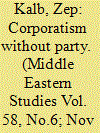|
|
|
Sort Order |
|
|
|
Items / Page
|
|
|
|
|
|
|
| Srl | Item |
| 1 |
ID:
187548


|
|
|
|
|
| Summary/Abstract |
Did the formation of the Islamic Republic of Iran empower or weaken workers? Scholars have mainly studied how regime consolidation between 1979 and 1983 weakened labor organizations. By contrast, I argue that the Iran-Iraq war (1980–88) empowered workers by compelling state actors to incorporate segments of the industrial workforce vertically into the state. Corporatism – the hierarchical integration of the state and organized groups representative of industrial labor – expanded workers’ associational bargaining power in post-revolutionary Iran. Triangulating between official and non-state archival sources, I propose three mechanisms leading to corporatist development in war-time Iran. First, inter-party and factional competition pushed state elites to accept revolutionary work councils as legitimate institutions. Second, war and international isolation forced managers, bureaucrats, and the military to support work councils in order to increase productivity and recruit worker-soldiers. Third, by asserting control over an expanding bureaucracy in charge of war mobilization, labor leaders were able to create a more autonomous organization, called the Workers’ House. In the MENA, corporatism is usually associated with authoritarian consolidation. By contrast, corporatist development in Iran led to industrial workers’ political inclusion. Corporatism in the Islamic Republic arguably improved labor rights, increased workers’ influence in policy-making, and helped broaden and institutionalize competition between political elites.
|
|
|
|
|
|
|
|
|
|
|
|
|
|
|
|
| 2 |
ID:
154103


|
|
|
|
|
| Summary/Abstract |
Private universities are a rapidly expanding form of education in Iran, and increasingly include Islam and the social sciences alongside the hard sciences too. What implications does the privatization of religious and social scientific knowledge have for the Islamic Republic? Scholarship has so far responded by looking at the ways in which the Iranian authoritarian state has monopolized religion, repressed the social sciences and hollowed out student activism. Complicating these arguments, this article provides a historical and institutional comparison of higher education in Iran in order to look at the evolving degree of autonomy of academic institutions and the ability of actors that operate within them to contribute to critical debate, social activism and novel discourse. The article proposes that while state universities and Islamic Azad suffer from politicization and control, a small set of privately owned “Islamic” universities is using its elite connections, financial independence and socio-pedagogical ties to the seminary and modern academia to secure enhanced levels of free debate and independent thinking.
|
|
|
|
|
|
|
|
|
|
|
|
|
|
|
|
|
|
|
|
|